 Petzlover
Petzlover Belgian Shepherd Dog (Malinois) is originated from Belgium but Schnoodle is originated from United States. Both Belgian Shepherd Dog (Malinois) and Schnoodle are of same height. Belgian Shepherd Dog (Malinois) may weigh 11 kg / 24 pounds lesser than Schnoodle. Both Belgian Shepherd Dog (Malinois) and Schnoodle has almost same life span. Both Belgian Shepherd Dog (Malinois) and Schnoodle has same litter size. Belgian Shepherd Dog (Malinois) requires Low Maintenance. But Schnoodle requires Moderate Maintenance
Belgian Shepherd Dog (Malinois) is originated from Belgium but Schnoodle is originated from United States. Both Belgian Shepherd Dog (Malinois) and Schnoodle are of same height. Belgian Shepherd Dog (Malinois) may weigh 11 kg / 24 pounds lesser than Schnoodle. Both Belgian Shepherd Dog (Malinois) and Schnoodle has almost same life span. Both Belgian Shepherd Dog (Malinois) and Schnoodle has same litter size. Belgian Shepherd Dog (Malinois) requires Low Maintenance. But Schnoodle requires Moderate Maintenance
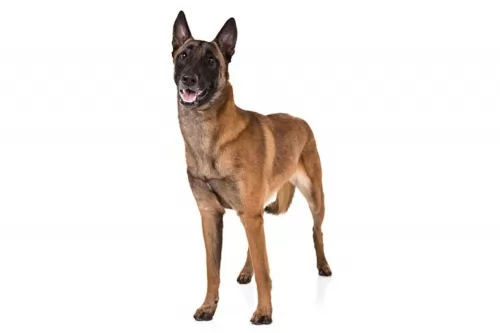 The Belgian Malinois is one of 4 Belgian Shepherd varieties. The dogs were developed- and hail from Belguim. The Malinois has a short, fawn colored coat. The American Kennel Club recognizes that the Malinois is a separate breed from the other 3 varieties. It was in 1892 that Professor Reul wrote the first Belgian Shepherd Dog standard, recognizing 3 varieties – dogs with short coats, dogs with long coats and dogs with rough coats.
The Belgian Malinois is one of 4 Belgian Shepherd varieties. The dogs were developed- and hail from Belguim. The Malinois has a short, fawn colored coat. The American Kennel Club recognizes that the Malinois is a separate breed from the other 3 varieties. It was in 1892 that Professor Reul wrote the first Belgian Shepherd Dog standard, recognizing 3 varieties – dogs with short coats, dogs with long coats and dogs with rough coats.
Today's Malinois goes back to a breeding pair owned by Adrien Janssens. It was in 1885 that he bought a fawn, rough-haired dog, breeding the dog with a short-haired dog named Lise de Laeken. After other breedings, the two dogs were recognized as ancestors of the modern Belgian Shepherd Dogs.
The city of Malines formed a club for the promotion of these fawn short hairs and the name Malinois became synonymous with them. In March 1992, the American Belgian Malinois Club received AKC parent club status.
 The Schnoodle was developed in the 1980s. It is believed the dog originates from the USA. This was when it was discovered that breeding the poodle with other dogs produced excellent mixes.
The Schnoodle was developed in the 1980s. It is believed the dog originates from the USA. This was when it was discovered that breeding the poodle with other dogs produced excellent mixes.
The idea with the Schnoodle was to develop a low-shedding dog. The Schnoodle is a mix between a Schnauzer and a Poodle,but because both the Poodle ad Schnauzer have different sizes, there is no knowing what size the Schnoodle will be.
Major kennels don’t recognize the Schnoodle as a breed.
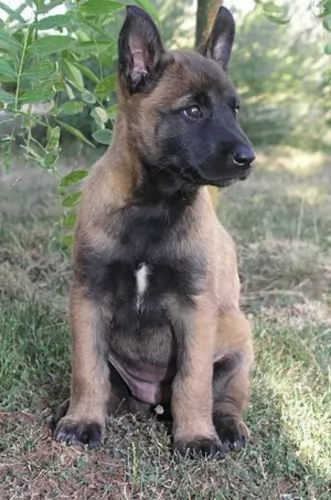 The Malinois is a medium-size Belgian shepherd dog. People sometimes mistake them for the German Shepherd as they are fairly similar to look at. The Malinois however is a smaller, lighter boned dog with naturally upright ears and a black-masked face. He is shorthaired and fawn-colored with black tips on the hairs, although other colors are brown or red too. He is an intelligent and active dog, always having been used for herding-, police- and rescue work.
The Malinois is a medium-size Belgian shepherd dog. People sometimes mistake them for the German Shepherd as they are fairly similar to look at. The Malinois however is a smaller, lighter boned dog with naturally upright ears and a black-masked face. He is shorthaired and fawn-colored with black tips on the hairs, although other colors are brown or red too. He is an intelligent and active dog, always having been used for herding-, police- and rescue work.
You’ll find the Malinois somewhat unpredictable as some are friendly and confident while other can be shy and withdrawn around strangers. This is a dog who loves to be around his human family, but to bring out the best in him, training and socialization classes will be necessary. Well-socialized Malinois are always good with children and other pets, more so if they’ve been raised with them.
 The Schnoodle is a cross between a poodle and a schnauzer and with the poodle parent in the mix, the dog is considered to be hypoallergenic.
The Schnoodle is a cross between a poodle and a schnauzer and with the poodle parent in the mix, the dog is considered to be hypoallergenic.
Because there are three sizes of Schnauzer, the Schnoodle can be medium sized but also fairly large. Weight of this dog can be anything from 6 to 45 Kg and he can stand at between 38cm to 66cm. The coat can be either wavy, straight or curly and will need to be brushed, stripped or clipped according to the coat they have.
The most common coat colors are grey, a mix of grey, silver and white, a fawn or creamish color and black. The medium sized ears are floppy.
Because this is a mixed breed you won’t get a fixed personality type and you won't find fixed looks. Because the dog comes from two excellent parent breeds, you can expect your schnoodle to be friendly, alert and very active.
They may not take readily to kids so it is up to the human owners to see that their children are brought up to be kind and respectful to dogs and animals. Your Schnoodle can be gentle too and stubborn but he will bond closely with his human family.
The smallish size of these dogs makes it a good choice for city or country life, but wherever he is, he will need lots of exercise. Schnoodles are smart and respond well to training.
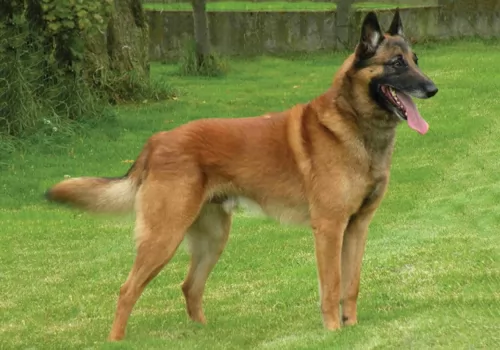 The Belgian Malinois makes a wonderful guard dog and he works hard to ensure that his human family, whom he adores, are well protected under his watch. They’re such intelligent dogs too that you may feel inclined to pass over some of your chores to him.
The Belgian Malinois makes a wonderful guard dog and he works hard to ensure that his human family, whom he adores, are well protected under his watch. They’re such intelligent dogs too that you may feel inclined to pass over some of your chores to him.
He responds well to training, and to get the best from this breed, start with training and socialization as soon as you bring your puppy home.
Socialization is excellent as it introduces your puppy to different people, animals as well as situations.
He is an adaptable dog and can live in an apartment if he is well exercised. He can be your devoted and loyal friend for a good number of years but you will have to do your part in providing him with the best care possible.
 Thanks to their parents, Schnauzer cross Poodles are smart, easy to train and fast learners.
Thanks to their parents, Schnauzer cross Poodles are smart, easy to train and fast learners.
Schnoodles are also fun-loving dogs, and they make great playmates for children. They are also a good choice for first time dog owners. A bonus part for dog owners is that these dogs are low shedding, making them great for anyone who suffers from allergies.
The Schnoodle forms strong bonds with their human family and this makes them both protector and watchdog. He is a great family dog with some excellent characteristics from each of the parent dog breeds involved.
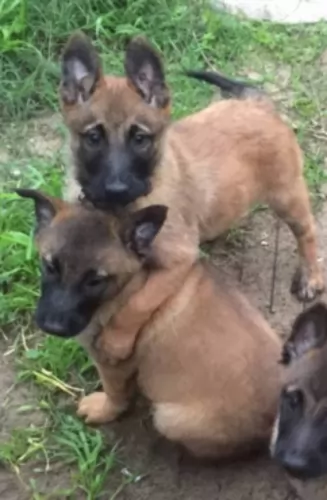 Belgian Malinois are generally healthy dogs. However every dog, regardless of breed, can pick up illnesses, and it is always wise to be aware of some of the diseases your Malinois might face.
Belgian Malinois are generally healthy dogs. However every dog, regardless of breed, can pick up illnesses, and it is always wise to be aware of some of the diseases your Malinois might face.
An inherited condition where the thigh bone doesn't fit properly into the hip joint. As the dog ages, arthritis can develop.
A degenerative eye disorder that can lead to blindness.
Brush his teeth at least 2 or 3 times a week to remove tartar build-up. Too much plague leads to inflamed gums, bad breath, pus inside the mouth and even loss of teeth.
 The Schnoodle is a robust, healthy breed, but unfortunately he can also succumb to any one of the many dog illnesses there are -
The Schnoodle is a robust, healthy breed, but unfortunately he can also succumb to any one of the many dog illnesses there are -
This refers to an eye disease which results in the deterioration of the retina. Your dog develops night blindness and this can lead to total blindness. Unfortunately there is no cure.
It can be horrible seeing your pet jerking and twisting out of control with seizures. You will need to get your pet to the vet as epilepsy can be a symptom of a bigger issue.
This is a life threatening disease where your dog’s stomach fills with gas and becomes hard and swollen. The stomach can twist. Symptoms of bloat include restlessness, drooling and trying to vomit.
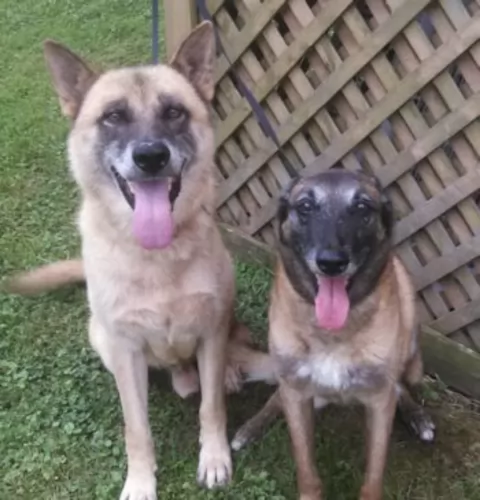 Because the Malinois is a constant shedder, with a couple of heavy shedding periods during the year, you’ll need to be conscientious with his grooming and brush him at least twice a week to get rid of loose hairs and to give his thick coat a glossy, healthy look to it.
Because the Malinois is a constant shedder, with a couple of heavy shedding periods during the year, you’ll need to be conscientious with his grooming and brush him at least twice a week to get rid of loose hairs and to give his thick coat a glossy, healthy look to it.
Because of their high energy, Malinois aren’t recommended for couch-potato type owners. It will be cruel to buy such a dog and to leave him to waste away with boredom and frustration in your back yard. He’ll want lots of rough and tumble, ball games, runs in the park or in the country and long walks.
Belgian Shepherd Malinois puppies are vulnerable when they’re tiny, and it would be wise to speak to your vet about superb nutrition to build up a puppy’s immune system.
An excellent way to ensure the health of your growing Malinois is to give him a home prepared meals along with commercially manufactured food recommended by your vet. You can’t just put a bowl of commercially manufactured dog food in front of him day after day month after month.
Apart from what your vet recommends, give him some brown rice, some cooked vegetables and some raw meat. Raw meat will ensure he can fight of skin infections. The age of the dog, emotional state and environmental influences can all play a role in skin diseases with dogs, but by ensuring some raw meat in his diet, the immune system is strengthened and skin disorders are eliminated. Always ensure a steady supply of fresh water.
 The Schnoodle is a dog that will need a good dose of exercise. Provide him with daily walks, walks in the park, hikes, runs along the beach as well as ball and rope games.
The Schnoodle is a dog that will need a good dose of exercise. Provide him with daily walks, walks in the park, hikes, runs along the beach as well as ball and rope games.
Always try to feed your dog a high quality food. Many people give their dogs one of the commercially manufactured foods there are because they are wonderfully convenient, and you get some good ones.
You don’t want to give this food to your dog day after day after day. Feed him some home-made food occasionally which can be added to his dry kibble twice a week. Boiled chicken, brown rice or pasta and spinach, sweet potatoes and carrots are a healthy choice for your pet.
You can boil it, chop it all up and add smaller portions to the dry kibble twice a week as a wonderful, tasty treat for your dogs.
Try and include some raw meat into the diet as this can help to fight of skin diseases. Ensure there is always a bowl of fresh, cool water for him.
Make sure all the necessary vaccines are up to date to avoid some of the deadly canine diseases there are.